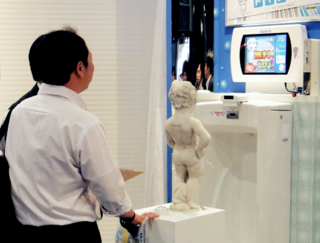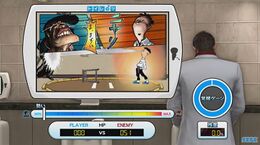Difference between revisions of "History of Toylets"
From Sega Retro
m |
m |
||
| Line 1: | Line 1: | ||
[[File:Toylet MannekenPis tradeshow.png|thumb|320px|right|[[Toylet]]'s unique features being demonstrated at an unknown Japanese trade show.]] | [[File:Toylet MannekenPis tradeshow.png|thumb|320px|right|[[Toylet]]'s unique features being demonstrated at an unknown Japanese trade show.]] | ||
| − | {{back| | + | {{back|Toylets}} |
==History== | ==History== | ||
Revision as of 04:32, 16 March 2023

- Back to: Toylets.
History
Sega's Toylet was first location-tested at four Tokyo Metro subway stations (including the stops at Akihabara and Ikebukuro) sometime around 2010, with the trial scheduled to end in January 2011. While the whereabouts of the original units are unknown, the location test appears to have been successful, and the Toylet was later officially released for sale the following October.[1]
Release
As one of the only commercially-produced interactive urinal systems, Toylet saw a great amount of interest on release, and was installed in a number of hotels, restaurants, and clubs around Japan.[2][3] It was also installed in a number of Sega's indoor theme parks, like Tokyo Joypolis.[2]
Interactive urinals like the Toylet are often seen as interesting novelty experiences, with numerous venues advertising their installations as a means to attract additional guests. Many Japanese venue owners in Japan specifically installed Toylets at their properties to draw in new customers[3], as the chance to experience a Toylet is often seen as a notable point-of-interest or destination for curious guests.
Reception
Toylet was well-received by the gaming press, both as a meaningful push in the area of commercial interactive urinals, and as also embracing's Sega's creative drive to make entertainment more relevant in every part of people's lives. While sales figures and market performance information are hard to come by, the talk and reception around the new urine-based gameplay was unanimously positive.
The interactive urinal industry had not progressed to a commercially-viable point by the era the Toylet was released, and remains that way to this very day. It was unlikely to have been an overly-profitable venture on an individual level, but its unique novelty and the amount of consideration paid to its design easily overshadowed any unprofitability with a significant amount of positive press and name recognition. Additionally, Sega's association as one of the world's top video game developers in the arcades, home, and handhelds now extended to an entirely new setting: the bathroom.
| “ | When I put the product on our toilets, our sales doubled! I'm surprised! Customers come to the store specifically for our toilets!
|
„ |
— Venue owners on their installed Toylets[3] | ||
Legacy

Toylet's unique nature has retained a strong legacy in Sega's history, and continues to be fondly remembered as both embodying the company's innovative spirit, and as history's most successful and well-known push in the area of commercial interactive urinals. Notably, the company maintains its installed units at Tokyo Joypolis, actively preserving the system's history and games while keeping it currently available to experience.
The Toylet appears in 2017's Yakuza Kiwami 2 as a reasonably-accurate simulation of the original hardware and software, controlled using a standard controller and utilizing much of the same art and design. Only two of the original's minigames are available: Bukkake Battle! Hana Kara Gyuunyuu and Dokitsu! Boufuu Keihou Hatsurei.
Photo gallery
Tamero! Shoubengozou Deluxe being demonstrated at an unknown Japanese trade show.
Tamero! Shoubengozou Deluxe being demonstrated at an unknown Japanese trade show.
References
| Toylets | |
|---|---|
| Topics | Technical specifications | History | List of games | Promotional material |



